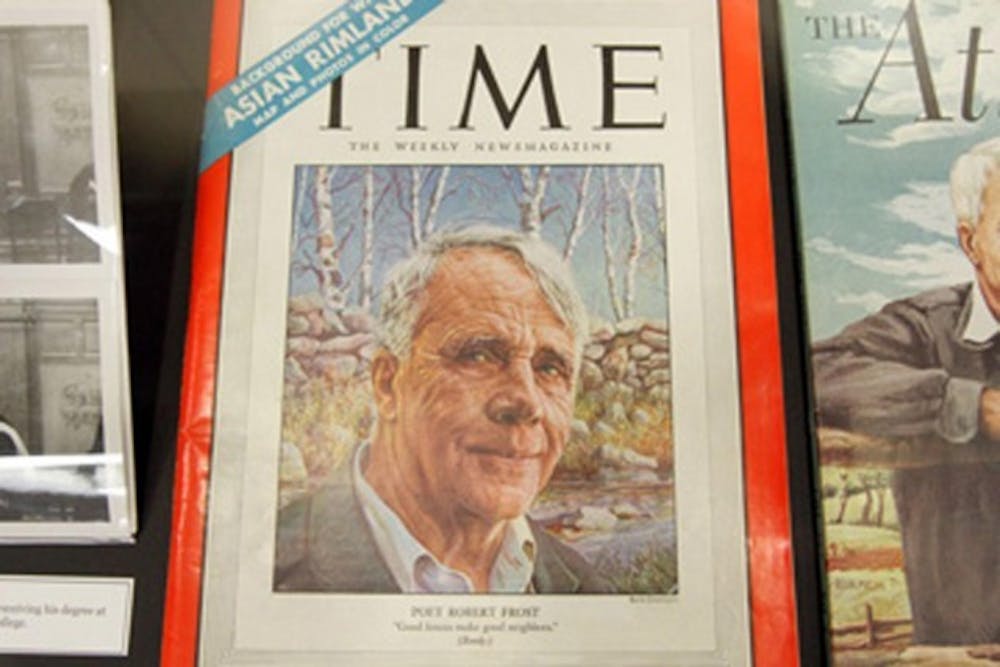Robert Frost - one of the most renowned American poets of the 20th century - died in 1963, but he hasn't lived out his last story. His life and his work are still intriguing today.
UB recently inherited a part of Frost's history, and for a limited time, members of the UB community can take the 'road less traveled' to the fifth floor of Capen Hall to experience it.
The Poetry Collection of the UB Libraries has extended its Frost display, which opened on Jan. 31, through the end of the semester.
In January, The Poetry Collection, renowned and respected in its own right,received an extensive collection of Frost materials that included books, newspaper clippings, letters and other artifacts documenting the relationship between Frost and Rabbi Victor E. Reichert.
Jonathan Reichert, a retired professor of physics from UB and son of the late rabbi, provided the documents, placing them on display to the public for the first time.
The story of the collection centers on Frost's extensive relationship with Rabbi Reichert, who Frost met by chance in 1939 at a poetry reading. Reichert was captivated by Frost's poetry, and Frost was intrigued by Reichert's religious role. The two men quickly developed a deeply intellectual, philosophical and religious friendship that materialized in the form of letters and other writings.
The history of this intimate connection between Frost and Reichert provides valuable insight into the life and creativity of the legendary poet.
The donation of the materials has added enough photographs, letters and other Frost relics to form the Victor E. Reichert Robert Frost Collection, which is currently on display at The Kaveeshwar Gallery on the fifth floor of Capen Hall.
Some of the pieces include: a 1950 issue of Time magazine with Frost on the front cover; a limited-edition copy of Frost's reading at John F. Kennedy's Inaugural Address in 1961; Frost's Congressional Medal, which he received in 1960; and the intimate, snapshot-like personal photographs of Frost himself.
James Maynard, associate curator of The Poetry Collection, said the value of the collection is indispensable because Frost is a universal name when it comes to American poetry.
"The name Robert Frost resonates so strongly with people as the defining poet of his generation," Maynard said. "We've had a lot of attention on this collection in ways that other collections of ours haven't received."
The amount of attention the collection has received is a testament to Frost's timelessness.
Christian Science Monitor, The Jewish Daily Forward and National Public Radio have all reported on the story of the Reichert-Frost Collection. Various Frost scholars have also been in contact with Maynard to use the materials for scholarly research and investigation.
The reaction has been overwhelmingly enthusiastic and positive - so overwhelming that The Poetry Collection has extended the exhibit's display until mid-May.
Barbara Bono, an associate professor of English, brought students from her discovery seminars course to experience the exhibit. For Bono, the showcase provides learning that is impossible to bring to the typical classroom setting.
"It makes literature come alive to [the students]," Bono said. "It makes them realize that [literature is] a human product, that it occurs within spectrums of human exchange [and] that it's related to living history. It made our enterprise come alive for them."
Frost's influence as a poet still lives on after his death 50 years ago. Stacy Hubbard, an associate professor of English, is fascinated by the power of Frost's poetry.
"For many people, Frost representsPoetry (with a capital 'P')," Hubbard said in an email. "He still has that kind of iconic status among ordinary readers, which means that he still shapes perceptions about poetry in a powerful way."
Despite his iconic status as a stronghold in American poetry, Frost is transformed into an ordinary, everyday person in the Reichert-Frost Collection. With such an intimate glimpse into his life through correspondence and photographs, the exhibit "humanizes" the renowned poet, according to Maynard. It also allows visitors to see Frost in new ways.
"Being curator of a collection like this, you never stop learning," Maynard said. "This has been an [opportunity] to learn more about Frost and about Reichert, about the lives of these two men and the friendship that they shared for decades."
For Hubbard, the collection is a vital resource for decoding the still-hidden mysteries of Frost; even the extensive scholarly work that currently exists relating to Frost does not cover it all.
"There is a lot more critical work that needs to be done on Frost," Hubbard said. "A reconsideration of many aspects of his language, his forms [and] his beliefs. There is new Frost scholarship waiting to be written and any one of our students might do it."
The Victor E. Reichert Robert Frost Collection will be on display until May 15.
Email: arts@ubspectrum.com





